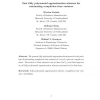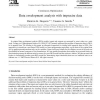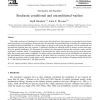84
Voted
EOR
2002
15 years 2 months ago
2002
Abstract. We present fully polynomial approximation schemes for the problem of minimizing completion time variance of a set of n jobs on a single machine. The fastest of these sche...
EOR
2002
15 years 2 months ago
2002
100
Voted
EOR
2002
15 years 2 months ago
2002
We introduce a measure of entropy for any discrete Choquet capacity and we interpret it in the setting of aggregation by the Choquet integral. Keywords : entropy, discrete Choquet...
66
Voted
EOR
2002
15 years 2 months ago
2002
89
Voted
EOR
2002
15 years 2 months ago
2002
EOR
2002
15 years 2 months ago
2002
This paper discusses various statistics for testing hypotheses regarding returns to scale in the context of non-parametric models of technical efficiency. In addition, the paper p...
114
Voted
EOR
2002
15 years 2 months ago
2002
In original data envelopment analysis (DEA) models, inputs and outputs are measured by exact values on a ratio scale. Cooper et al. [Management Science, 45 (1999) 597
65
Voted
EOR
2002
15 years 2 months ago
2002
127
Voted
EOR
2002
15 years 2 months ago
2002
Within data envelopment analysis (DEA) is a sub-group of papers in which many researchers have sought to improve the differential capabilities of DEA and to fully rank both effici...
86
Voted
EOR
2002
15 years 2 months ago
2002
This article constructs a foundation for warfare at the individual level, where agents in two groups fire and absorb shots according to a non-stationary Poisson process. We determ...





